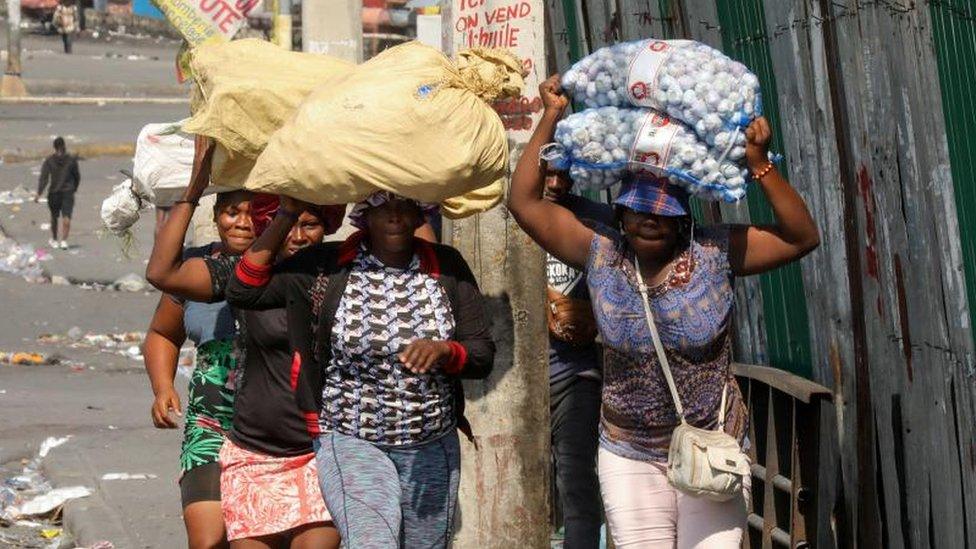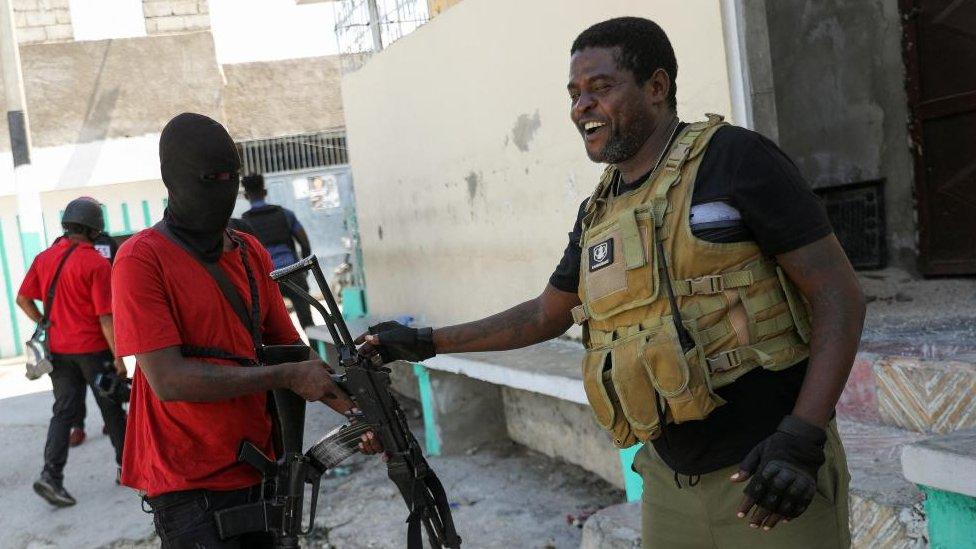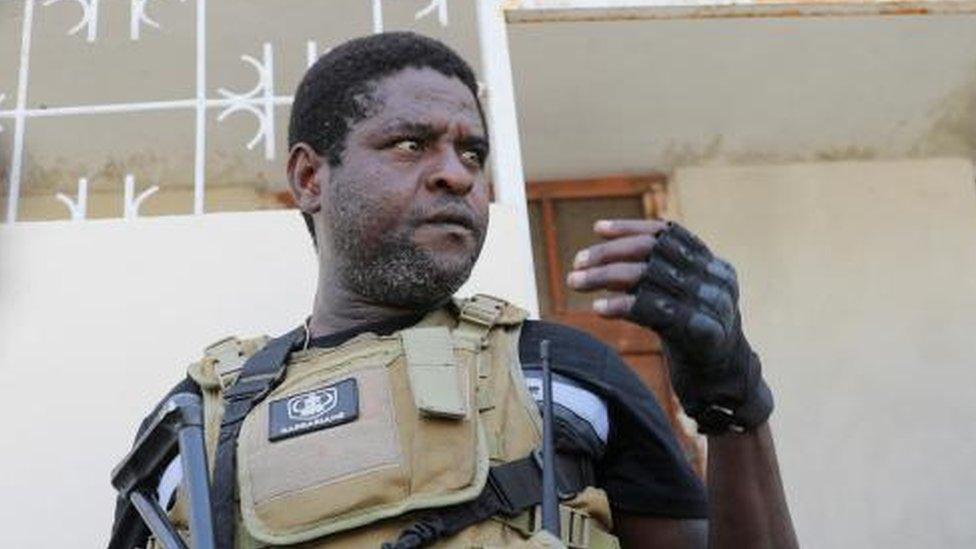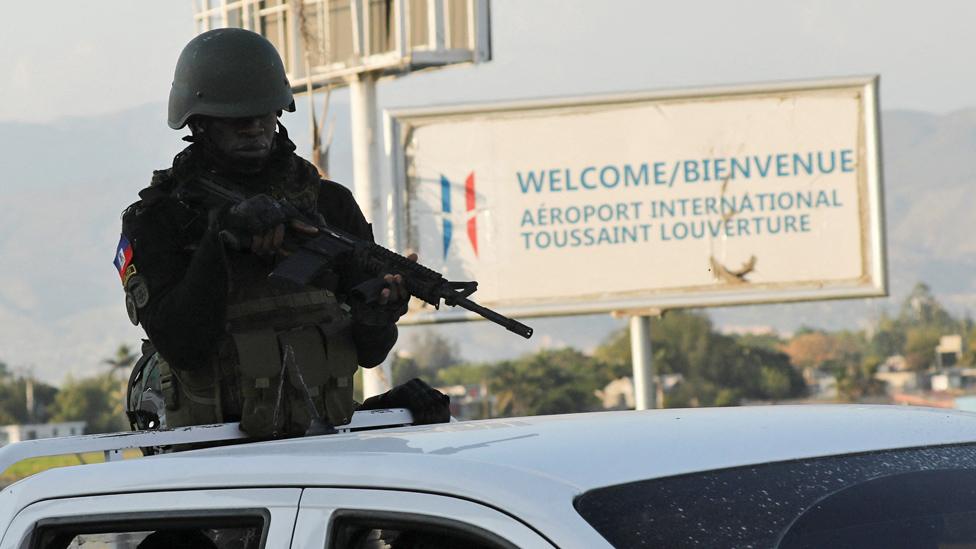Haiti gangs torch police stations as PM's future hangs in balance
- Published

More than 15,000 people have fled their homes in the last week due to the violence
Gangs pushing for the ouster of Haitian Prime Minister Ariel Henry have been setting fire to police stations in the capital, Port-au-Prince.
The police station located in the busy Salomon market is the latest to be targeted, according to local media.
The three-day state of emergency has now been extended by a month.
The gangs in the violence-wracked city stepped up their attacks when Mr Henry left for a regional summit last week.
The unrest has paralysed air traffic, which has prevented his return.
Mr Henry attempted to fly back to Port-au-Prince on Tuesday but ended up in the US territory of Puerto Rico instead.
He could not land in the Haitian capital because its international airport was closed as soldiers repelled attempts by gunmen to seize it.
Civil aviation authorities in the neighbouring Dominican Republic also turned the prime minister's plane away, saying that they had not been provided with the necessary flight plan.
Mr Henry has not given any public statements since he visited Kenya, where he met President William Ruto to salvage a deal for the African country to lead a multi-national force to help restore order in Haiti.
The two leaders signed a reciprocal agreement which paves the way for 2,000 Kenyan police officers to be sent to Haiti but a Kenyan opposition politician says he will challenge the deal in court.
Meanwhile, several Kenyan police officers who had volunteered for the deployment have opted out for their safety.
One officer told the BBC that there were no clear mechanisms on how they were required to work while on the mission. Another said some members of his squad had withdrawn following the recent rise in violence.
Gangs in Port-au-Prince have taken advantage of Prime Minister Ariel Henry's absence to unleash a series of co-ordinated attacks.
Among their targets was the airport - which they want to control to prevent Mr Henry from flying back in - and two prisons, from which they freed thousands of inmates.
They have also set the peace court in Croix-des-Bouquets on fire and looted or torched more than 20 other buildings, according to a tally compiled by The National Human Rights Defense Network (RNDDH), external.
At least six police officers have been killed while the National Police Academy has also been destroyed.
The bodies of several prisoners were also left lying on the streets after the storming of the National Penitentiary.
The violence has caused Haiti's humanitarian crisis to deteriorate even further.

Gang leader Jimmy "Barbecue" Chérizier has been holding news conferences as his G9 gang alliance has attacked key buildings
Aid groups estimate that more than 15,000 people have fled their homes in the past week.
The UN's Humanitarian Co-ordinator in Haiti, Ulrika Richardson, told the BBC's Newshour programme the situation on the ground was "extremely dire and very alarming".
"We have big parts of the capital paralysed: schools are closed, many hospitals have had to close, either because of a lack of equipment or simply that staff cannot get to work," she said.
The gangs have not said what their aim is beyond the ouster of Mr Henry.
Jimmy "Barbecue" Chérizier, a former police officer who leads an alliance of gangs called G9, has threatened that if Mr Henry does not step down there will be a "civil war" which he said could end in "genocide".
Caribbean nations as well as the US have urged Mr Henry to take steps to "finalize a political accord".
Irfaan Ali, the president of Guyana who is currently chairing regional body Caricom, said there had to be "a political solution to anchor any stabilization of security and humanitarian efforts".
In a video message, external, Mr Ali said that Caricom had not been able "to reach any form of consensus between stakeholders in Haiti" despite round-the-clock efforts to get the government and key figures in the opposition, private sector, civil society and religious organisations to agree on the way forward.
Additional reporting by Ian Wafula in Nairobi.
Related topics
- Published6 March 2024

- Published5 March 2024
